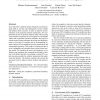Free Online Productivity Tools
i2Speak
i2Symbol
i2OCR
iTex2Img
iWeb2Print
iWeb2Shot
i2Type
iPdf2Split
iPdf2Merge
i2Bopomofo
i2Arabic
i2Style
i2Image
i2PDF
iLatex2Rtf
Sci2ools
64
Voted
OOPSLA
2015
Springer
2015
Springer
A formal foundation for trace-based JIT compilers
Trace-based JIT compilers identify frequently executed program paths at run-time and subsequently record, compile and optimize their execution. In order to improve the performance of the generated machine instructions, JIT compilers heavily rely on dynamic analysis of the code. Existing work treats the components of a JIT compiler as a monolithic whole, tied to particular execution semantics. We propose a formal framework that facilitates the design and implementation of a tracing JIT compiler and its accompanying dynamic analyses by decoupling the tracing, optimization, and interpretation processes. This results in a framework that is more configurable and extensible than existing formal tracing models. We formalize the tracer and interpreter as two abstract state machines that communicate through a minimal, well-defined interface. Developing a tracing JIT compiler becomes possible for arbitrary interpreters that imples interface. The abstract machines also provide the necessary ho...
| Added | 16 Apr 2016 |
| Updated | 16 Apr 2016 |
| Type | Journal |
| Year | 2015 |
| Where | OOPSLA |
| Authors | Maarten Vandercammen, Jens Nicolay, Stefan Marr, Joeri De Koster, Theo D'Hondt, Coen De Roover |
Comments (0)

